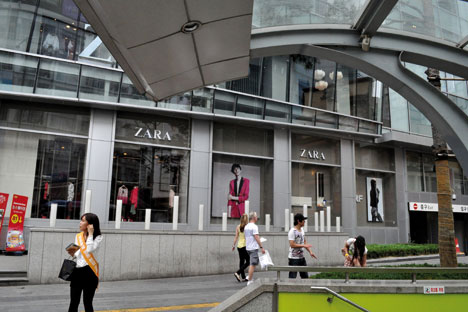Zara’s predicament in Korea is a reminder that big brands can never take success for granted. Despite much excitement around its launch in 2008, the Spanish clothing and accessories retailer has struggled in the market and was recently expelled from Lotte’s department stores.
According to AsiaOne Business, Koreans have grown disillusioned with the brand, which markets itself as trendy but cheap, as its prices in the country are 25 per cent above those in the US and China. Finding the brand overpriced in a very competitive market, Koreans just aren’t buying it.
This year, the brand plunged in Campaign’s Asia’s Top 1000 Brands ranking for Korea, from 55th place in 2013 to 210th. What can it do to raise its value in the eyes of fashion-conscious Koreans, while reducing the mark-up it has placed on its goods?
|
The Zara conflict with Lotte has less to do with performance and more to do with an inability to adapt to market realities. A like-for-like comparison with the only other major SPA (specialty retailer of private label apparel) brand in Korea, discount retailer H&M, is misguided in a market where the economic downturn has affected all high-end priced brands. Zara entered the market far earlier than H&M and adopted a pricing and marketing strategy that took advantage of the profligate consumer spending trends at that time, while H&M entered the market later, during a spending decline. The Lotte relationship, in which the company owns a 20 per cent stake in Zara Retail Korea and opened 19 of the 40 stores nationwide, is an important break. The fact that Zara is trying to compete with Uniqlo and H&M on the same basic business concept, with a pricing strategy that places the product at levels just below Iceland, (Korea is basically the most expensive Zara market) does not make much sense. Zara needs to adapt to the realities of the situation, but lowering prices and thereby lowering the brand image is not so easily done in a market like Korea. It is clear the original profitable pricing strategy needs to be retooled in line with their global concept to stay competitive. |
Zara was removed from Lotte’s Anyang branch after showing poor sales performance. For other Zara branches in department stores, things are not looking good. Large flagship Zara stores are located close to Zara’s shops in department stores, causing an overlap. These flagship stores frequently hold flat-price bargain sales the department stores cannot freely conduct because of their own sales policy. Zara Retail Korea has lacked a tailored marketing strategy for the Korean market. It is urgent for Zara to resolve this as it can no longer just settle for a one-size-fits-all formula like ‘Style = Zara’. Other SPA (specialty retailer of private label apparel) brands are developing high-end fashion for the Korean market. Some have a strong competitive edge through fabric, style and design. Other global SPA brands such as Joe Fresh, COS, and GU are better at understanding and marketing to Korean consumers, while local brands are presenting products that reflect consumers’ preference and body shape. However, the most pressing issue is Zara’s pricing policy. Local consumers find it cheaper to buy through overseas online shopping sites. The offline price discrepancy between the US, Japan or China compared to Korea is also considerable. Zara must now find a way to protect its market share from its competitors. |










